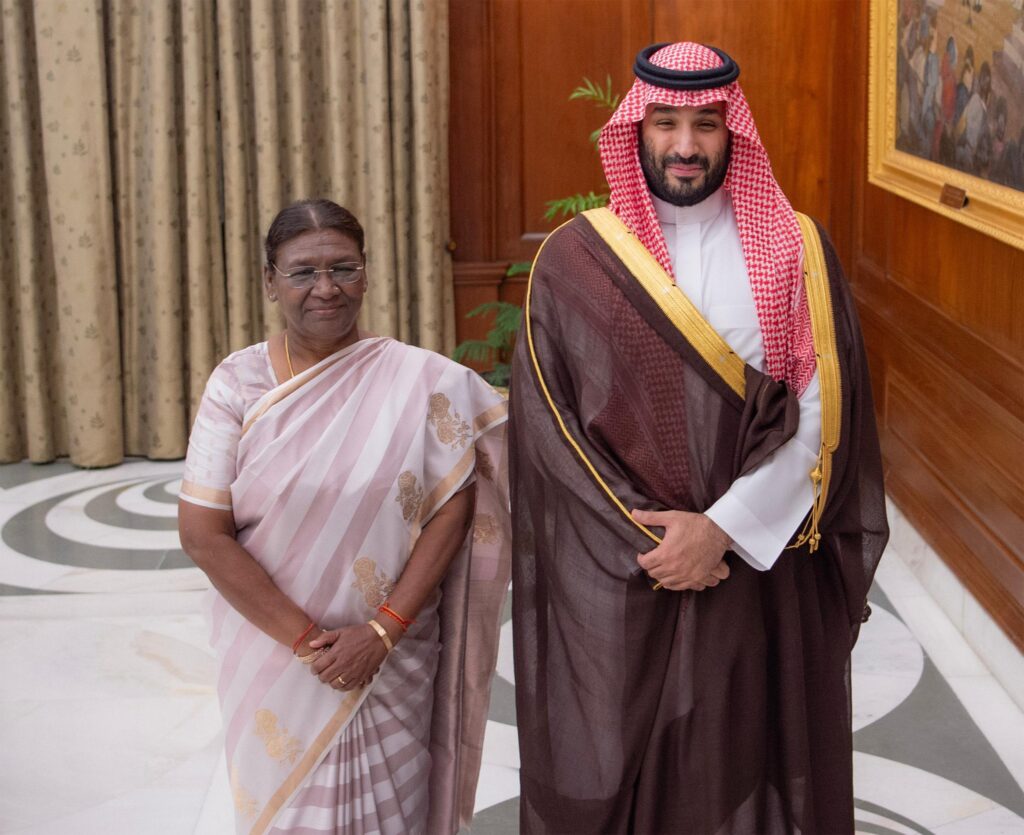On his latest trip to India, the Saudi Crown Prince did not include a visit to Islamabad.

The Crown Prince
also joined India in condemning terrorism and urging governments to stop sponsoring terrorism against other countries, dismantle terrorist infrastructure, and prosecute terrorists.
Saudi Crown Prince Mohammed bin Salman’s state visit to India earlier this week to deepen the two nations’ strategic ties signaled a significant shift in regional dynamics.
His refusal to combine his trip to New Delhi with a visit to Islamabad demonstrated his desire to focus on India and shift away from the tradition of viewing the relationship through the lens of Indo-Pakistan rivalry.
The Crown Prince also joined India in condemning terrorism and urging governments to stop sponsoring terrorism against other countries, dismantle terrorist infrastructure, and prosecute terrorists.
The visit comes as Saudi Arabia strives to diversify its economy away from its reliance on oil in order to encourage commerce and investment in the kingdom.
India and Saudi Arabia discussed how to establish an early free trade agreement between India and the Gulf Cooperation Council members to strengthen trade and commercial ties.
Before beginning his state visit on September 11, the Crown Prince, often known as MBS, attended the two-day G20 conference in New Delhi.
MBS had previously met with Prime Minister Narendra Modi and US President Joe Biden to announce the India-Middle East-Europe corridor project. The project seeks to increase commerce and investment, as well as energy and digital cooperation and connection among India, West Asia, and Europe.
Strengthening bonds
“In Saudi Arabia, our relationship is in our DNA.” India is a friend of ours. Over the last 70 years, they have assisted us in the construction of Saudi Arabia. The Crown Prince stated, “There is a lot of Saudi work in India.” “This trip will highlight Saudi work done here in India and ensure that our relationship is maintained and improved for the sake of both countries.”
A discussion was held at their Strategic Partnership Council meeting on ways to improve collaboration in sectors ranging from commerce and investment to digital technologies and climate change to defense and security and cultural linkages.
Energy, petrochemicals, renewable energy, agriculture and industry, IT and communications, digitalisation and electronic manufacturing, and social and cultural sectors were all signed by both parties.
The Modi-MBS conversations took place at a time when both parties were looking to widen their strategic choices. Both India and Saudi Arabia have positive relations with the United States. They are, however, strengthening relations with other countries in order to expand their economies and position themselves as appealing investment and industrial hubs.
Saudi Arabia is the world’s second-largest oil producer. It is commonly recognized as the head of the Islamic world, particularly among Sunni Muslims, as the guardian of the two holy mosques at Mecca and Medina. Saudi Arabia is an important supplier of energy for India, and it is home to nearly 3 million Indians who work and live there.
Under MBS, who is effectively seen as the ruler, Riyadh is attempting to create strong ties with countries other than the US, its primary security provider, in order to diversify its security arrangements.
China’s presence in the Gulf and West Asian countries has grown in recent years. China’s political weight has also grown following its successful mediation of a diplomatic rapprochement between Saudi Arabia and Iran in March.
However, Riyadh does not want to rule out any possibilities and has sought out to India to expand the strategic cooperation. Another factor that may have encouraged the Saudis to improve ties with India is the tension in relations between Saudi Arabia and its former ally and Gulf neighbor, the United Arab Emirates.
Saudi-Emirati relations have worsened as they compete for GCC supremacy. India maintains strong ties with the UAE, which have recently been reinforced and expanded to include cooperation in a variety of fields. India is likewise eager to strengthen ties with Saudi Arabia in order to broaden its choices in the Gulf and the Arab world.
Pakistan is dissatisfied.
Meanwhile, Pakistan appears to be dissatisfied with the evolution of Indo-Saudi relations. When the Crown Prince visited India in 2019, he also visited Pakistan and China. He dropped both this time, possibly due to India’s sensitivity.
The India-Middle East-Europe Corridor, according to Pakistan’s Dawn newspaper, is not always a bad thing. However, due to “internal issues” and “inadequacies,” Pakistan has primarily become a spectator rather than an active participant in such networks.
Despite India’s “atrocious human rights record” in Kashmir, the West and its Muslim brothers are keen to do business with India, according to the report.
Also Read North Korea and Russia Meetings

[…] Also Read Saudi Prince Meets […]